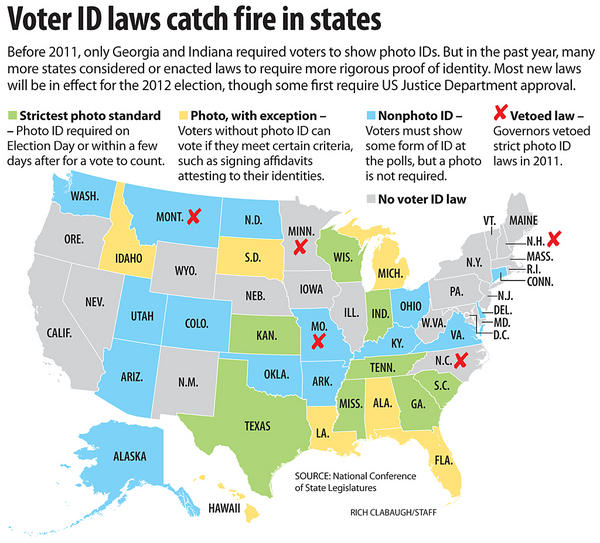Voter ID Ruling Outsmarts the Law, For Now


Across the media, the headlines got it wrong when they claimed “Judge Upholds Voter ID Law in Pennsylvania,” or some variation of that assertion.
Even though it took Commonwealth Court Judge Robert Simpson some 70 pages to explain his decision, the decision did not “uphold” the law. The decision only denied the plaintiffs’ application for a preliminary injunction. The grounds were as simple as they were legalistic: Judge Simpson found no basis for suspending the law at once because the plaintiffs’ could not show it would be unconstitutional in every conceivable circumstance.
The legal issue is “facial constitutionality,” or whether the voter ID law is unconstitutional on its face, which is a hard standard to meet. All other questions of substance remain untouched by this decision and remain to be litigated in further court actions, especially any which consider the law “as applied,” or as it works in practice.
That’s what the judge meant in the summary of his decision: “Petitioners’ counsel did an excellent job of ‘putting a face’ to those burdened by the voter ID requirement. At the end of the day, however, I do not have the luxury of deciding this issue based on my sympathy for the witnesses or my esteem for counsel. Rather, I must analyze the law, and apply it to the evidence of facial unconstitutionality brought forth in the courtroom, tested by our adversarial system. For the foregoing reasons, I am constrained to deny the application for preliminary injunction, without prejudice to future ‘as applied’ claims.” [Emphasis added.]
In other words, Judge Simpson’s decision on the injunction has no weight whatsoever in any future challenge to the law and any claims of actual harm it may cause.
Judge Simpson, 61, and as an elected judge, may have an interest in how his decision might affect the electorate that put him in office. He did not discuss this possible conflict in his decision. He is serving a ten-year term that ends in December 2021.
The voter ID bill was partisan and passed on a partisan vote. The Pennsylvania House Majority Leader Mike Turzai (R), from Allegheny, made the political strong arming crystal clear last June: “Voter ID, which is going to allow Governor Romney to win the state of Pennsylvania, done.”
Ever since 1964, the South has been increasingly safe for Republicans and there’s an ugly racial element to that. Richard Nixon made that explicit with his so-called southern strategy and Ronald Reagan affirmed it when he started his 1980 campaign in Philadelphia, Mississippi, while that community was still protecting the murderers of Civil Rights workers there in 1964.
Since January 2011, Republican majorities in eleven state legislatures have passed voter ID laws designed to skew the vote toward Republican candidates in those eleven states. The Brennan Center for Justice tracks these laws through its Democracy Program that “seeks to change the ways in which citizens participate in their government by fixing the systems that discourage voting, hinder competition and promote the interests of the few over the rights of the many.”
In Texas and South Carolina, with their long histories of suppressing minority voting, the U.S. Justice Dept. has intervened to block both states from implementing their voter ID laws. In Wisconsin, Dane County Circuit Judge Richard Niess ruled in July that the Republican-passed voter ID law was unconstitutional on its face, writing in part: "A government that undermines the very foundation of its existence - the people's inherent, pre-constitutional right to vote - imperils its legitimacy as a government by the people, for the people, and especially of the people…. It sows the seeds for its own demise as a democratic institution. This is precisely what 2011 Wisconsin Act 23 does with its photo ID mandates." So saying, he issued a permanent injunction against the State of Wisconsin, preventing it from further implementing the law. The state has appealed the decision.
Those who promote voter ID laws, who tend to be Republicans, argue that the purpose is to prevent voter fraud. Preventing voter fraud is a laudable goal. In reality there is virtually no voter fraud in the United States, especially voter fraud that would be cured by voter ID. In the rare instances where voter fraud occurs, it’s much more likely the Indiana Secretary of State, the state’s top election official, Charlie White, convicted on six felony counts in January, who commits voter fraud – not some 95-year-old black woman with no birth certificate who had been voting for fifty years after half a lifetime of exclusion. White, while he was still in office, had been an ardent defender of voter ID laws to prevent voter fraud.
Voter fraud is rare in the United States, at least voter fraud by individual voters. Even in the Pennsylvania case, the state admitted before trial that it has no cases of voter fraud to offer as evidence of the need for a voter ID law. Voter fraud is only slightly more common than tsunamis in Arizona – the easiest cure for both non-existent problems is to do nothing. Unless, of course, you have some other purpose in mind, as Pennsylvania House majority leader Turzai made plain.
Disputes over voter ID laws are no small matter, no distraction from more important issues. Voter ID laws are a Republican effort to keep a minority party in office by keeping minorities from voting, an effort to rig the system itself.



